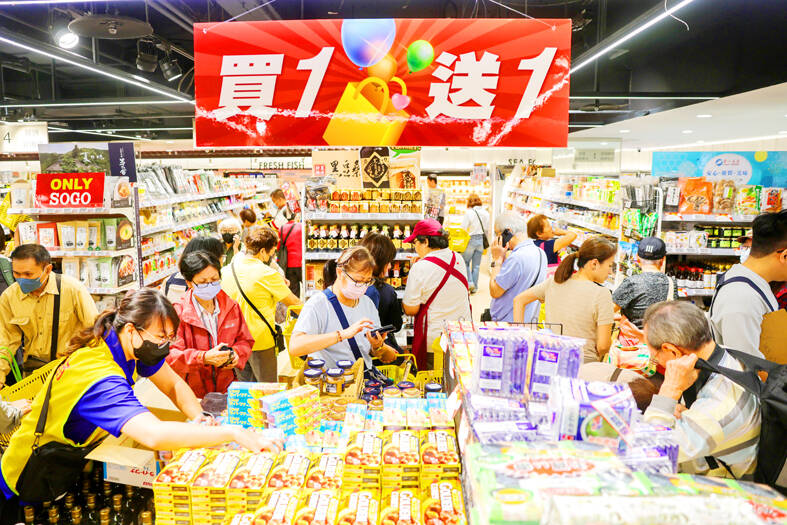Taiwan’s consumer price index (CPI) rose 1.48 percent year-on-year last month, marking the sixth consecutive month that inflation has remained below the central bank’s 2 percent target, the Directorate-General of Budget, Accounting and Statistics (DGBAS) reported yesterday.
However, the pace of increase was slightly faster than September, mainly due to higher recreational service costs during the holiday weekends, the DGBAS said.
Pork prices surged 9.07 percent from a year earlier — the sharpest rise in 20 months — although the impact of the recent African swine fever outbreak has yet to be fully reflected, DGBAS official Tsao Chih-hung (曹志弘) said.

Photo: CNA
“The government has stepped in to stabilize the market so that pork prices would remain stable this month,” Tsao said.
Tsao said that sufficient stocks of chilled and frozen pork cover at least a month of consumption, helping to keep prices steady. Wholesale pork prices have begun to retreat as the supply of fresh pork returned to normal following the lifting of slaughterhouse bans.
Core CPI, which excludes volatile items such as fruit, vegetables and energy to better track long-term price movements, increased 1.84 percent — the highest annual increase in nine months — but has stayed below the 2 percent threshold for 18 consecutive months, signaling overall price stability, the DGBAS said.
“If the weather remains stable, CPI growth this month should be similar to or lower than October’s level,” Tsao said.
Among the CPI’s seven major categories, miscellaneous items posted the largest annual increase of 3.18 percent, led by a 10.65 percent rise in personal accessories such as gold and jewelry and a 2.41 percent increase in personal care service fees. Food prices rose 2.02 percent, buoyed by a 5.43 percent increase in meat prices, although lower vegetable and fruit prices offset some of the gains.
Housing costs increased 2 percent, driven primarily by higher rent, household management fees and electricity bills.
Education and recreation expenses rose 1.44 percent, as extended holidays in October pushed up prices for tour packages and hotel accommodations, alongside a 2.48 percent increase in tutoring and learning fees.
In contrast, the producer price index (PPI) last month fell 3.5 percent from a year earlier, mainly due to lower prices for chemicals, pharmaceuticals, petroleum, basic metals, computers and optical products, the DGBAS said.
For the first 10 months of the year, the CPI grew 1.74 percent, while the PPI declined 1.71 percent from a year earlier, it said.

RUN IT BACK: A succesful first project working with hyperscalers to design chips encouraged MediaTek to start a second project, aiming to hit stride in 2028 MediaTek Inc (聯發科), the world’s biggest smartphone chip supplier, yesterday said it is engaging a second hyperscaler to help design artificial intelligence (AI) accelerators used in data centers following a similar project expected to generate revenue streams soon. The first AI accelerator project is to bring in US$1 billion revenue next year and several billion US dollars more in 2027, MediaTek chief executive officer Rick Tsai (蔡力行) told a virtual investor conference yesterday. The second AI accelerator project is expected to contribute to revenue beginning in 2028, Tsai said. MediaTek yesterday raised its revenue forecast for the global AI accelerator used

TEMPORARY TRUCE: China has made concessions to ease rare earth trade controls, among others, while Washington holds fire on a 100% tariff on all Chinese goods China is effectively suspending implementation of additional export controls on rare earth metals and terminating investigations targeting US companies in the semiconductor supply chain, the White House announced. The White House on Saturday issued a fact sheet outlining some details of the trade pact agreed to earlier in the week by US President Donald Trump and Chinese President Xi Jinping (習近平) that aimed to ease tensions between the world’s two largest economies. Under the deal, China is to issue general licenses valid for exports of rare earths, gallium, germanium, antimony and graphite “for the benefit of US end users and their suppliers

Dutch chipmaker Nexperia BV’s China unit yesterday said that it had established sufficient inventories of finished goods and works-in-progress, and that its supply chain remained secure and stable after its parent halted wafer supplies. The Dutch company suspended supplies of wafers to its Chinese assembly plant a week ago, calling it “a direct consequence of the local management’s recent failure to comply with the agreed contractual payment terms,” Reuters reported on Friday last week. Its China unit called Nexperia’s suspension “unilateral” and “extremely irresponsible,” adding that the Dutch parent’s claim about contractual payment was “misleading and highly deceptive,” according to a statement

Artificial intelligence (AI) giant Nvidia Corp’s most advanced chips would be reserved for US companies and kept out of China and other countries, US President Donald Trump said. During an interview that aired on Sunday on CBS’ 60 Minutes program and in comments to reporters aboard Air Force One, Trump said only US customers should have access to the top-end Blackwell chips offered by Nvidia, the world’s most valuable company by market capitalization. “The most advanced, we will not let anybody have them other than the United States,” he told CBS, echoing remarks made earlier to reporters as he returned to Washington